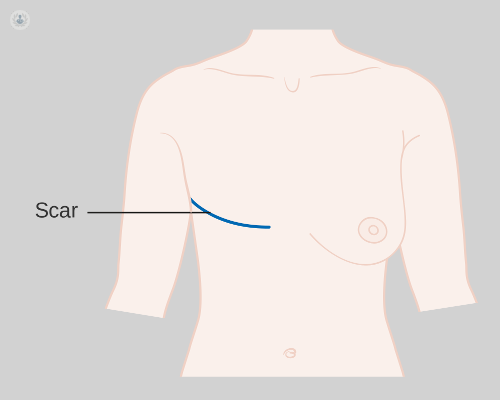

What is a mastectomy?
A mastectomy is a surgical procedure performed using general anaesthetic that removes an entire breast. This is used to treat breast cancer and often involves removing most of the breast tissue, skin and the nipple. Depending on where the cancer is present, a single or double mastectomy will be performed. Mastectomy is often followed by breast reconstruction surgery.

Why is a mastectomy done?
A mastectomy will be recommended if the breast cancer is in a large area of the breast, has spread throughout the breast tissue and if the breast has pre-cancerous cells in it. Also, some women will have a mastectomy if they have a very high risk of developing breast cancer, even if no cancer is currently present.
What does a mastectomy involve?
The surgeon starts by making an incision across the breast so that the tissue can be removed (including the nipple and some skin) as well as tissues that cover the chest muscles. Once the tissue is removed, a drainage tube is placed to prevent fluid build-up within the breast space in the first few days following surgery. The incision will be closed with stitches, eventually leaving a scar that stretches across the chest and into the armpit.
There are different types of mastectomy:
How do you prepare for a mastectomy?
Prior to surgery you will have met with the surgeon to ask any questions and be made aware of how the operation is carried out and potential risks to be aware of. You will also be given advice on bras and inserts, if required. You may be receiving complementary chemotherapy as well to reduce the size of the tumours, which you will discuss with your specialist.
Aftercare following a mastectomy
Following a mastectomy, you will have a dressing over the wound, with one or two drainage tubes. It is expected to feel sore for a number of days which painkillers will be administered to manage. Wounds take roughly 2-3 weeks to heal, but a few months for the chest and arm area recovers fully. You will be bruised, stiff and swollen initially.
Most are able to go home either the same day or the day following the operation. If a breast reconstruction was performed the same day, then staying in the hospital for up to a week will be necessary.
Arm exercises will be recommended to encourage movement back to arms and shoulders. These can be done as soon as they feel comfortable, usually 3 weeks after surgery. It is essential for recovery to avoid strenuous exercise and driving for up to 3-4 weeks following surgery.
Patients will generally take between 4-8 weeks off work and normal activities.
Are there any alternative treatments to a mastectomy?
Your breast cancer treatment will depend on:
Sometimes it is not necessary to have a mastectomy and breast-conserving surgery will be more suitable (lumpectomy). Discussing your options with a specialist will be essential in making your treatment decision.
